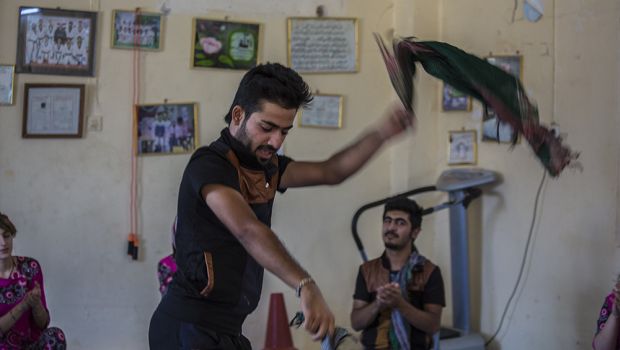On a baking hot Monday afternoon just before the start of Ramadan, a group of teenagers filed into a dilapidated sports hall in Kirkuk.
There was no air-conditioning and no watercooler, and the sweat dripped down their faces as they started to dance. But they beamed ecstatic smiles despite the heat and their exhaustion.
“Whoever believes in Mohammed will be watching!” shouted Hassan Qadr by way of tough-love encouragement. The dancers barely needed reminding of that.
The group, Halparki Kirkuk, have been together for just over a year. Its nine men and nine women perform traditional Kurdish dancing, although some of its members are not Kurdish, but Arab. That, says one of the dancers, makes it a perfect microcosm of Kirkuk itself—a multicultural city made up of Kurdish, Arab and Turkmen communities, where Sunnis, Shi’ites and Christians live alongside each other.
The group has become famous locally, and later this month they will—they hope—become famous right across the Middle East too. On July 27 they will be performing their routine on Arab Idol, the Beirut-based TV talent show that pulled in an audience of 100 million for last season’s finale.
“We’re not nervous, we’re on fire!” said one dancer, a young man with a bright white smile and gelled hair. “Everyone here is looking forward to it.”
Halparki got their big break when they were spotted on local television by Ragheb Alama—one of the Middle East’s best-known pop stars and a judge on Arab Idol—in January. He was so impressed that he tracked down the group and invited them onto the show.
A lot of things have happened in Kirkuk between then and now. On June 10, the Islamic State of Iraq and Syria (ISIS) launched a surprise attack on Mosul, Iraq’s second city, before advancing into Tikrit and southwards towards Baghdad.
As in Mosul and other cities, the Iraqi army in Kirkuk crumbled. They deserted their bases and fled, leaving local criminals to loot what was left behind. But the vacuum was quickly filled by the Peshmerga—the Kurdish armed forces that, until that day, had served alongside the Iraqi army in Kirkuk.
This multicultural city has been caught in the middle of a long-running dispute between the Kurdistan Regional Government in Erbil and the federal government in Baghdad. The Kurds claim that it is their historic capital and belongs in their jurisdiction. But Kirkuk is oil-rich, and Baghdad has always refused to let it go. It seems as though Iraq’s crisis may have resolved the issue: Kirkuk now falls under the Kurds’ sphere of influence, and Baghdad has bigger problems than to ask for it back.
All the signs are that the Kurds will push for their full independence from Iraq. For now they have their own de facto state, albeit one that shares a 600-mile (966-kilometer) border with a newly established and hugely hostile “Islamic Caliphate.”
ISIS territory begins just a few miles away from where Halparki are rehearsing their routine. In Kirkuk’s southern suburbs, the Peshmerga are battling the Islamists. The dancers here know that if ISIS were to enter the city, they would no longer be allowed to dance together as men and women; maybe they wouldn’t be allowed to dance at all.
“It would be disastrous for the people,” said one of the dancers. “We are all getting ready to defend our land and our people.”
This article was originally published in The Majalla.
All views expressed in this blog post are those of the author and do not necessarily represent the views of, and should not be attributed to, The Majalla magazine.

